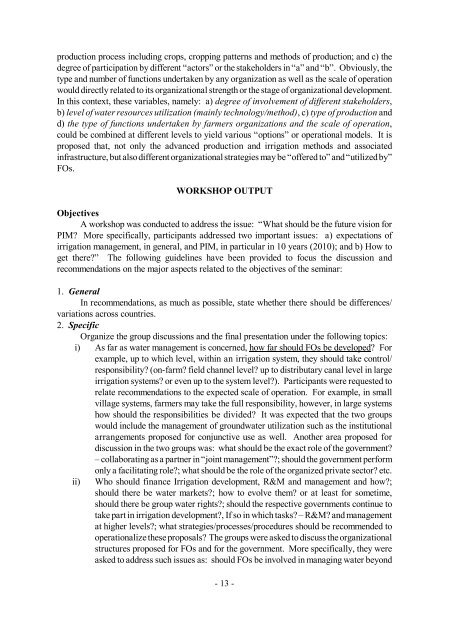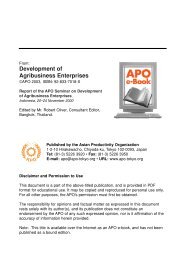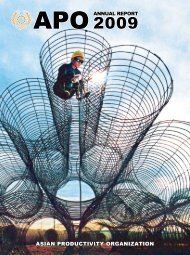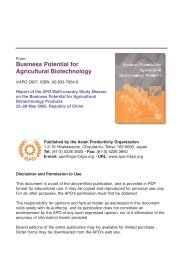Organizational Change for Participatory Irrigation Management
Organizational Change for Participatory Irrigation Management
Organizational Change for Participatory Irrigation Management
Create successful ePaper yourself
Turn your PDF publications into a flip-book with our unique Google optimized e-Paper software.
production process including crops, cropping patterns and methods of production; and c) the<br />
degree of participation by different “actors” or the stakeholders in “a” and “b”. Obviously, the<br />
type and number of functions undertaken by any organization as well as the scale of operation<br />
would directly related to its organizational strength or the stage of organizational development.<br />
In this context, these variables, namely: a) degree of involvement of different stakeholders,<br />
b) level of water resources utilization (mainly technology/method), c) type of production and<br />
d) the type of functions undertaken by farmers organizations and the scale of operation,<br />
could be combined at different levels to yield various “options” or operational models. It is<br />
proposed that, not only the advanced production and irrigation methods and associated<br />
infrastructure, but also different organizational strategies may be “offered to” and “utilized by”<br />
FOs.<br />
WORKSHOP OUTPUT<br />
Objectives<br />
A workshop was conducted to address the issue: “What should be the future vision <strong>for</strong><br />
PIM? More specifically, participants addressed two important issues: a) expectations of<br />
irrigation management, in general, and PIM, in particular in 10 years (2010); and b) How to<br />
get there?” The following guidelines have been provided to focus the discussion and<br />
recommendations on the major aspects related to the objectives of the seminar:<br />
1. General<br />
In recommendations, as much as possible, state whether there should be differences/<br />
variations across countries.<br />
2. Specific<br />
Organize the group discussions and the final presentation under the following topics:<br />
i) As far as water management is concerned, how far should FOs be developed? For<br />
example, up to which level, within an irrigation system, they should take control/<br />
responsibility? (on-farm? field channel level? up to distributary canal level in large<br />
irrigation systems? or even up to the system level?). Participants were requested to<br />
relate recommendations to the expected scale of operation. For example, in small<br />
village systems, farmers may take the full responsibility, however, in large systems<br />
how should the responsibilities be divided? It was expected that the two groups<br />
would include the management of groundwater utilization such as the institutional<br />
arrangements proposed <strong>for</strong> conjunctive use as well. Another area proposed <strong>for</strong><br />
discussion in the two groups was: what should be the exact role of the government?<br />
– collaborating as a partner in “joint management”?; should the government per<strong>for</strong>m<br />
only a facilitating role?; what should be the role of the organized private sector? etc.<br />
ii) Who should finance <strong>Irrigation</strong> development, R&M and management and how?;<br />
should there be water markets?; how to evolve them? or at least <strong>for</strong> sometime,<br />
should there be group water rights?; should the respective governments continue to<br />
take part in irrigation development?, If so in which tasks? – R&M? and management<br />
at higher levels?; what strategies/processes/procedures should be recommended to<br />
operationalize these proposals? The groups were asked to discuss the organizational<br />
structures proposed <strong>for</strong> FOs and <strong>for</strong> the government. More specifically, they were<br />
asked to address such issues as: should FOs be involved in managing water beyond<br />
- 13 -
















